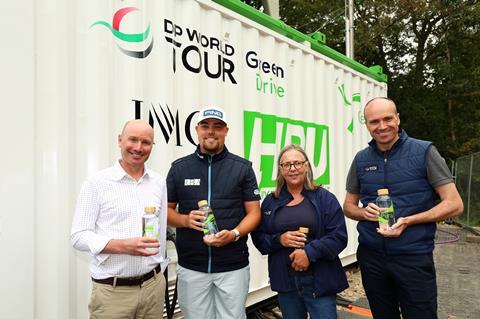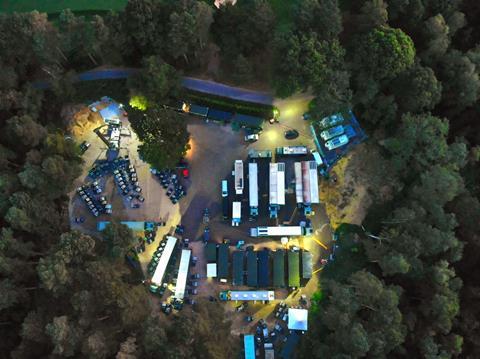IMG head of engineering, studios, Brian Leonard gives advice on how to approach live production without damaging the environment

In an era marked by increasing environmental awareness, the pressure is on the media industry to adapt to more sustainable production practices, and the world of sport is no exception. Broadcasting live sporting events comes with certain environmental considerations, from energy consumption to waste production. However, with careful planning and innovative solutions, it’s possible to produce coverage of these events more sustainably.
At IMG, we have put sustainability at the core of our broadcast productions. A key focus and passion for me is to continuously review our green practices to see where improvements can be made. It’s been my experience in recent years that areas such as content creation, connectivity and bandwidth, food services, and monitoring power usage are where the media industry can make big strides.
Connectivity and infrastructure
One key element in producing a live sporting event is maintaining seamless communication among all stakeholders, including organisers, broadcasters, and fans. This often requires extensive use of technology and robust connectivity solutions. However, it also potentially requires extensive capex investment in laying fibre cable, for example.
One solution is to invest in the infrastructure for fixed-location events. In principle, the more events you do at the same location, the more you can invest in its connectivity infrastructure, and even double-down to utilise renewable energy options like solar or wind power. This reduces reliance on fossil fuels and minimises the event’s carbon footprint, which is ultimately good for the organisers’ sustainability goals too.
Last year, in partnership with the DP World Tour, we were able to explore the use of alternative fuels for the 2023 BMW PGA Championship at Wentworth. The event became the world’s first sports broadcast powered by 100% green hydrogen, resulting in practically zero emissions and produced 50L of drinkable water per hour. And whilst that may not be a feasible option for all events and productions, it just shows what can be done under the right circumstances.
Monitoring power
Monitoring the power we use is also a crucial step towards fostering sustainability for the future. By closely monitoring our energy consumption, we gain insight into our habits and patterns, allowing us to make informed decisions about how we utilise resources. Through monitoring, we can identify areas where energy is being wasted and implement measures to mitigate this waste, whether by adopting energy-efficient appliances, adjusting our usage behaviours, or investing in renewable energy sources.

Understanding our power consumption empowers us to make better decisions about replacing dirtier forms of energy without sacrificing the quality of these alternative energy sources. At IMG, this led us to partner with green energy provider, Good Energy, who guarantee that all their power is 100% renewable.
On-site suppliers
As most people know, food consumption at live sporting events can be associated with large amounts of waste and carbon emissions, mainly due to the prevalence of meat-heavy menus. However, there’s a growing trend towards offering plant-based meal options, which cater to diverse dietary preferences and contribute to sustainability efforts – whether that’s for crew, spectators or fans.
This means collaborating with sustainable caterers specialising in plant-based meals or having strong sustainability commitments. Or even having the conversation to encourage existing catering partners to source ingredients locally to reduce food miles and support local farmers.
Sustainable Media Content
Lastly, we are an industry of content creators, and this presents a remarkable opportunity to make a positive difference in the world. By focusing on topics like sustainability in media production, we can leverage our platform to raise awareness, inspire action, and drive meaningful change.
Done well, it not only educates and informs viewers, also but embodies the values of environmental responsibility. By amplifying voices, sharing stories, and sparking conversations about pressing environmental and social challenges, content can serve as a catalyst for progress – whether that be through documentaries highlighting environmental issues, news coverage of sustainable initiatives, or entertainment that promotes eco-friendly lifestyles. Our industry has the power to shape perceptions, influence behaviour, and make a step forward to a more sustainable future.
Ultimately, sustainably producing a live sporting event requires a holistic approach that addresses various aspects of event and broadcast operations, from connectivity and food services to energy usage. Change needs to be driven by people who have the ability to think differently, challenge the existing workflows and adopt new ways of working.
By prioritising practices such as optimising connectivity and bandwidth, offering plant-based meals, and reducing diesel power usage, the industry can start to minimise its environmental footprint while still delivering an exceptional broadcast experience for everyone. Embracing sustainability isn’t just about minimising harm - it’s about seizing the opportunity to create positive change and inspire others to do the same.

Brian Leonard is head of engineering, studios, at IMG




No comments yet